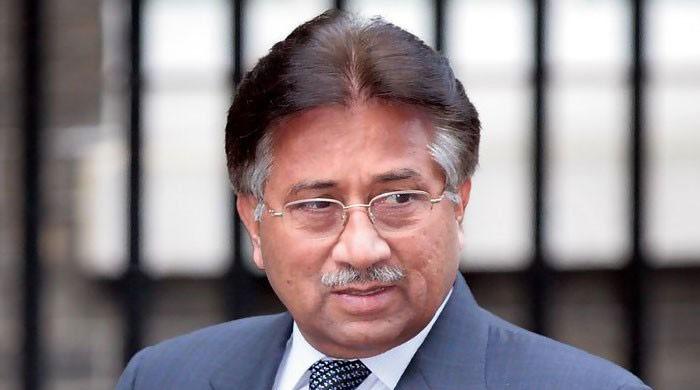The five charges against Gen Pervez Musharraf
 In its verdict, the special court stated ormer president General (retd) Pervez Musharraf had 'been afforded more than his due share of fair trial” and “given every opportunity to defend himself'. Photo: File
In its verdict, the special court stated ormer president General (retd) Pervez Musharraf had 'been afforded more than his due share of fair trial” and “given every opportunity to defend himself'. Photo: File
A special court on Tuesday sentenced former president Gen (retd) Pervez Musharraf to death for imposing a state of emergency on November 3, 2007, among other charges.
The case was heard by a bench comprising Justice Waqar Ahmad Seth of the Peshawar High Court, Justice Shahid Karim of the Lahore High Court and Justice Nazar Akbar of the Sindh High Court.
In its detailed verdict released on Thursday, the special court stated that Musharraf had “been afforded more than his due share of fair trial” and “given every opportunity to defend himself”.
The court added “the facts of the case are well documented” and “clearly demonstrate guilt on part of the accused”.
Musharraf treason case: All evidence points to crime of high treason, court says
“We, with the majority of 2 as to 1, allow the complaint and hold the accused guilty of high treason as defined at Article 6 of the Constitution and pass punishment under section 2 High Treason (Punishment) Act, 1973. Thus, the convict be hanged by his neck till he is dead,” the judgement issued read. Justice Akbar had dissented from the decision.
According to the verdict, there are five charges framed on the former military ruler, and for each charge, he has been handed one count of the death sentence.
Here are the five charges against Musharraf:
The first charge against Musharraf concerns him as then chief of the army staff issuing an unconstitutional and unlawful Proclamation of Emergency Order on November 3, 2007. The order unconstitutionally and unlawfully held the constitution in abeyance. Thus he subverted the constitution and committed the offence of high treason punishable under Section 2 of the High Treason (Punishment) Act 1973, which is within the jurisdiction of the special court established under Section 4 of the Criminal Law Amendment (Special Courts) Act 1976.
Secondly, on November 3, 2007, Musharraf issued the “Provisional Constitution Order No 1 of 2007”, which unconstitutionally and unlawfully empowered the president to amend the constitution from time to time. He also suspended the fundamental rights enshrined in Articles 9, 10, 15, 16, 17, 19 and 25 of the Constitution, subverted the Constitution and thus committed the offence of high treason.
Read also: Can a case against Justice Seth be made in the Supreme Judicial Council?
The third charge against Musharraf is that, as president of Pakistan, he issued the “Oath of Office (Judges) Order 2007” whereby an oath was unconstitutionally and unlawfully introduced in the schedule which required a judge to abide by the provisions of the proclamation of emergency to perform acts and functions in accordance thereof. The order resulted in removal of a number of judges of the superior courts, including the then chief justice Iftikhar Muhammad Chaudhry.
Fourthly, Musharraf issued the “Constitution (Amendment) Order 2007” whereby Articles 175, 186-A, 198, 218, 270B and 270C were unconstitutionally and unlawfully amended and Article 270AAA was added to the constitution, which was later removed through the 18th Amendment. Thus he subverted the Constitution and committed the offence of high treason punishable under Section 2 of the High Treason (Punishment) Act.
And, lastly, Musharraf issued the Constitution (Second Amendment) Order 2007, whereby the Constitution was unconstitutionally and unlawfully amended and, thereby, he subverted the constitution and committed the offence of high treason.
High treason caseThe Pakistan Muslim League-Nawaz (PML-N) government had filed the treason case against Musharraf in November 2007.
Read also: 'Ridiculous, barbaric': Paragraph 66 of Musharraf verdict draws outcry
The former army chief was indicted in the case in March 2014 after he appeared before the court. He had rejected all the charges.
On March 18, 2016, the former president left Pakistan for Dubai for medical treatment after his name was removed from the Exit Control List on the orders of the Supreme Court.
A few months later, the special court had declared him a proclaimed offender and ordered the confiscation of his property owing to his continuous inability to appear.
Later, his passport and identity card were also cancelled on the orders of the apex court.
He was pronounced guilty of high treason and sentenced to death by hanging for his crimes on Dec 17, 2019.


Post a Comment